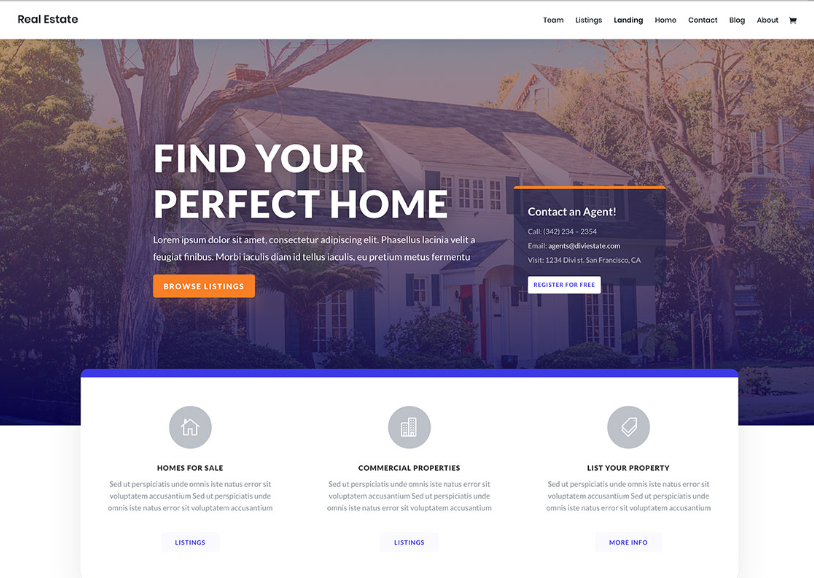Are you overwhelmed by the thought of starting a real estate blog, yet intrigued by how it could boost your business? You’re not alone. Studies show that real estate professionals with a robust online presence tend to attract more leads.
This guide will demonstrate an easy-to-follow roadmap on how to kickstart your own captivating and beneficial real estate blog. Ready for the journey? Let’s dive in!
Key Takeaways
- A real estate blog is more than a platform for information; it’s a tool to showcase expertise, build credibility, and nurture relationships with potential clients. Consistent, high-quality content demonstrates competence and fosters trust, setting you apart from competitors.
- Utilize SEO strategies to boost your blog’s visibility, employ e-mail newsletters, and focus not just on promotion but on engaging with your audience to create meaningful interactions.
- To start a blog, choose a suitable web hosting service, secure a domain name that reflects your brand, opt for a blogging platform that aligns with your needs, and design your blog while maintaining consistency with your branding.
- Selecting relevant topics, implementing SEO techniques, adopting a conversational writing style, using visuals and formatting techniques, breaking up content into reader-friendly sections, and incorporating calls to action are pivotal to creating captivating blog posts.
- Building a successful blog goes beyond content creation. A robust social media strategy and linking to authoritative sites can drive traffic. Equally important is analyzing your blog’s performance through tools like Google Analytics and focusing on lead generation to track your blog’s success.
The Benefits of Starting a Real Estate Blog
Starting a real estate blog offers several benefits, such as establishing expertise, building relationships with potential clients, and increasing website traffic and visibility.
Establishing your expertise
A real estate blog serves as a platform to showcase your knowledge and understanding of the industry. By consistently publishing detailed articles on various facets of the real estate market, you get an opportunity to demonstrate your competence.

High-quality content can position you as a leading voice in the field, broadening your reach and attracting prospective clients who trust your insights. As a result, both your personal brand and business gain credibility and visibility.
This move also sets you apart from competitors who may not have taken up blogging yet or are inconsistent with their content quality or schedule.
Building relationships with potential clients
Establishing connections with prospective clients is a key benefit of starting a real estate blog. As a real estate agent, your blog allows you to showcase your expertise and offer value to readers who can potentially turn into clients.
Through consistent high-quality content, you are providing useful tips and advice that help potential clients navigate the complex real estate market.

Additionally, engaging with readers in the comments section or through social media can further foster these relationships.
By answering queries or simply acknowledging their feedback, you demonstrate commitment toward their needs which helps build trust – an essential factor for transforming page visitors into leads for your real estate business.
Increasing website traffic and visibility
It’s fulfilling to provide valuable advice and insights, but the main goal in this business is to generate leads. When readers subscribe, download lead magnets, or comment, you gather email addresses to build your database.
After that, it’s about nurturing these leads until they require your services.
Boosting the number of visitors to your real estate blog can significantly enhance its visibility on the internet. An effective method for achieving this is implementing search engine optimization (SEO) strategies.
E-mail newsletters can also provide an avenue for reaching out directly to those who have shown interest in past articles or listings. Remember not merely promoting but engaging with others online creates conversations that magnetize even more users towards the site.
How to start a real estate blog
Starting a real estate blog can be a valuable investment for any real estate professional looking to grow their business.
If you have a website for your real estate business, awesome! You can simply add a blog section by working with your web host or designer.

But if you’re starting from scratch, no worries – just follow the step-by-step instructions below. I am going to make it as straightforward as possible!
Select a web hosting service
A web hosting service is a platform that lets you create, store, and showcase your website on the internet.
Certain web hosting providers even offer domain name services, making it easy for you to snag a unique web address. This way, folks can find you via Google or a direct link.

Some specialized web hosts go the extra mile by allowing you to design your website right from their user-friendly platforms.
Squarespace and WordPress are a couple of well-known names in this space. Many real estate agents opt for specialized website hosts that offer domain name services.
Choose the one that clicks with you, and you’ll be all set to dive into the world of starting a real estate blog.
Secure a domain name
Certain web hosts enable you to purchase a domain name directly from them. Others require you to connect a domain name you bought from a domain registrar.
Either way, each company should provide straightforward instructions on how to complete its unique domain-linking process.
When picking a domain name, make sure it’s a solid reflection of your real estate business, since you’re committing to it for the long haul. The best strategy is to keep it clear and easy to remember.
Opt for a blogging platform
If your chosen web host doesn’t offer a content management system, you’ll need to choose a separate platform and integrate it with your website.
Consider factors like advanced post scheduling and user-friendly drag-and-drop tools when deciding where and how to embark on your real estate blogging journey. The more intuitive the tool, the more helpful it’ll be for you.
You can start a blog for free on platforms like Medium, Blogger, or WordPress.com but you’ll have limited features and customization options. So, it’s better to self-host and download the platform for free.
Select a theme or design
Maintain consistency with your brand colors and established logo. Keep your design sleek and navigation-friendly. You’ll have the option to go with a pre-designed theme or code one from scratch.

Either route works, as long as you choose a style that both you and your audience will enjoy using.
Tips for Writing Engaging Real Estate Blog Posts
To build one of the best real estate blogs, start by choosing appropriate topics that are relevant to your target audience. Implement SEO strategies, such as using keywords and optimizing meta tags, to improve your search engine visibility.

Write in a conversational style to connect with readers and make the content more relatable. Use visuals and formatting techniques, like bullet points or headers, to break up the text and make it easier to read.
By following these tips, you can create a compelling real estate blog post that attracts and engages potential clients.
Choosing appropriate topics
Choosing appropriate topics is crucial for a successful real estate blog. Here are some tips to help you select the right topics:
- Research your target audience’s interests and needs: Understand what your prospective clients are looking for in real estate content. Consider their demographics, preferences, and pain points to create relevant and valuable blog posts.
- Stay up-to-date with industry trends: Keep an eye on the latest developments in the real estate market. Topics related to current trends, such as housing affordability, home improvement ideas, or local real estate market updates, can attract readers’ attention.
- Address common questions and challenges: Think about common questions or challenges that people may have when it comes to buying or selling properties. Create informative blog posts that provide solutions and helpful advice.
- Explore niche topics: Consider focusing on specific niches within real estate marketing, such as luxury homes, sustainable living, or investment properties. Targeting a niche can help you stand out from competitors and attract a more specialized audience.
Implement SEO strategies
Implementing SEO strategies is essential for maximizing the visibility and reach of your real estate blog. To optimize your blog posts for search engines and attract more organic traffic, consider the following:
- Research relevant long-tail keywords: Use tools like Google Keyword Planner to find keywords that are frequently searched by your target audience. Incorporate these keywords naturally into your blog posts to improve their search engine ranking.
- Write informative meta descriptions: Craft compelling meta descriptions that accurately represent your blog post’s content. These short summaries appear in search engine results and can entice users to click on your link.
- Use keyword-rich headings and subheadings: Break up your content with headings and subheadings that include relevant keywords. This not only helps readers skim through your post but also makes it easier for search engines to understand the structure of your content.
- Optimize image alt tags: When including visuals in your blog posts, optimize the alt tags by describing what the image represents using relevant keywords. This helps search engines identify and index your images correctly.
- Build internal and external links: Linking to other pages within your own site (internal linking) and reputable external sites (external linking) helps establish credibility with search engines. It also enhances user experience by providing additional resources or reference points.
- Monitor website speed: Page loading speed is an important ranking factor for search engines. Optimize images, reduce unnecessary plugins, and use caching mechanisms to ensure that your website loads quickly.
Write in a conversational style
When writing in a conversational style for your real estate blog, it’s important to make your readers feel like they’re having a friendly conversation with you.
Use short and simple sentences that are easy to understand, and avoid using jargon or technical terms that may confuse your audience.
By adopting a casual tone and speaking directly to your readers, you can create a connection and keep them engaged throughout your blog post.
Remember to use personal pronouns like “you” and “we” to make the content more relatable.
This approach can help build trust with your readers and establish yourself as a knowledgeable real estate professional.
Using visuals and formatting techniques
Incorporating visuals in your real estate blog posts can greatly enhance the overall user experience.
Images, videos, diagrams, charts, memes, and infographics are all fantastic resources for breaking up lengthy text portions.
Ensure that each image is pertinent to the nearby content, enriches the topic, includes a descriptive caption, and aids in clarifying your message for your audience.
Using Short Paragraphs
Breaking up your content into easily digestible paragraphs is a reader-friendly approach. A wall of text can be overwhelming and challenging to navigate. Aim for paragraphs consisting of three to four concise sentences.
In fact, don’t hesitate to utilize one-sentence paragraphs to maintain a smooth reading flow. This technique encourages your readers to progress effortlessly through your content.
So don’t underestimate the power of visuals and formatting when it comes to creating captivating real estate blog posts.
Incorporating a call to action (CTA)
Keep in mind that your blog posts serve a purpose beyond just being enjoyable reads. They’re meant to drive targeted traffic to your site and capture potential leads.
Prior to publishing your content, ensure that you’ve prompted your readers to take specific actions, such as filling out a form, exploring your website, getting in touch with your team, or engaging in another relevant activity.
Promoting Your Blog
Once you have created your real estate blog, it is essential to promote it to attract visitors and generate leads. Here are two effective ways to promote your blog:
Social Media Strategy
Social media is an excellent tool to promote your blog and reach a wider audience. You can use social media platforms like Facebook, Twitter, Instagram, and LinkedIn to share your blog posts with your followers.

To create a successful social media strategy, you need to identify the platforms that your target audience uses the most and create engaging content that resonates with them. You can also use relevant hashtags to increase your reach and encourage your followers to share your posts.
It is essential to maintain a consistent posting schedule and engage with your followers by responding to their comments and messages. By building a strong social media presence, you can attract more visitors to your blog and establish yourself as an authority in the real estate industry.
Linking to Other Authoritative Sites
Linking to other authoritative sites can help improve your blog’s credibility and attract more visitors. When you link to other sites, make sure they are relevant to your content and provide value to your readers.
You can also reach out to other real estate bloggers and ask them to link to your blog in their posts. This can help you build relationships with other bloggers and attract new visitors to your blog.
Additionally, you can participate in online forums and communities related to the real estate industry and share your blog posts with the members. By providing valuable insights and engaging with the community, you can attract more visitors to your blog and establish yourself as an expert in the field.
In conclusion, promoting your real estate blog is an essential part of your marketing efforts. By creating a strong social media strategy and linking to other authoritative sites, you can attract more visitors to your blog and generate leads for your business.
Analyzing Your Success
Once you have started your real estate blog, it’s important to analyze your success to see what’s working and what’s not. Here are two key areas to focus on:
Google Analytics
Google Analytics is a powerful tool that can help you track your blog’s performance. By using Google Analytics, you can see how many people are visiting your blog, where they are coming from, how long they are staying, and what pages they are visiting.

To get started with Google Analytics, you will need to create an account and add a tracking code to your blog. Once you have done this, you can start tracking your blog’s performance and making data-driven decisions about how to improve it.
Lead Generation
One of the main goals of your real estate blog should be to generate leads. By providing valuable content and building a relationship with your readers, you can attract potential clients and turn them into leads.
To track your lead generation efforts, you can use tools like lead magnets, landing pages, and email marketing campaigns. By tracking the number of leads you generate each month, you can see how effective your strategies are and make changes as needed to improve your results.
Overall, analyzing your success is a critical part of building a successful real estate blog. By using tools like Google Analytics and focusing on lead generation, you can attract more leads and grow your business over time.
Conclusion
Starting a real estate blog can be a great way to establish yourself as an authority in the industry and attract potential clients. By following the steps outlined in this guide, you can create a blog that provides value to your readers and helps you stand out in a crowded market.
Give readers value by sharing your know-how on market trends, buying/selling tips, and more. And don’t forget to keep things interesting with engaging posts, whether they’re detailed guides or quick tips.
Finally, you should be consistent in your blogging efforts. This means setting a regular schedule for publishing new content and sticking to it.
By doing so, you can build a loyal following of readers who look forward to your insights and perspectives on the real estate market.
Overall, starting a real estate blog can be a great way to provide more value to your clients and establish yourself as a trusted expert in the industry.
Whether you’re just starting out or looking to take your existing blog to the next level, the tips and strategies outlined in this guide can help you achieve your goals and succeed in the competitive world of real estate blogging.

